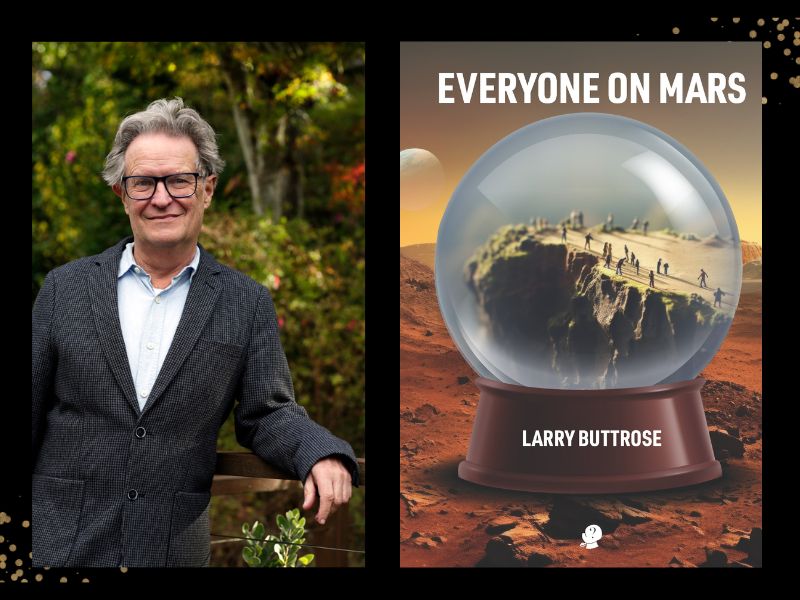Everyone on Mars comprises 12 independent short stories imagining what may happen were humans to colonise the planet Mars; the focus is on people rather than technology.
The real conditions on Mars are by now well-known. It has two moons. There are frequent dust storms. Temperatures can vary in a single day from about 20 degrees Celsius to minus 150. And the surface gravity of Mars is about 40% of what we enjoy on Earth.
That Larry Buttrose chooses to completely disregard the effects of such a massive gravity differential in his stories, then, is strikingly strange. While fiction writers are obviously entitled to describe things any way they wish, Buttrose’s evident unwillingness to engage with one of the most distinctive characteristics of the planet – the planet on which he specifically elected to set his stories – casts a shadow across the tales.
There is still fun to be had, though. The standout story, ‘Science Fiction’, is an historian’s account of recent events on an Earth initially familiar to us but, because Mars has now been colonised, the Earth ends up in a frighteningly different direction. Of all the ways in which Earth and Mars may be populated in the years to come, what happens in this tale is plausible.
‘Dark Matter’ morphs from cheery conversation between two people on a field trip to Mars into a grim horror story. Dark matter, after all, can refer to things other than the invisible components of the universe.
The very short, short story, ‘Writers in Residence’, extols the virtues of the printed book:
Electronic books are as ineffable as the ideas they come from: they lack the authority and truth of print stamped into paper, something you can touch and hold and that will never alter. Turn the gadget off and where are the e-books?
But will weight outweigh sentimental baggage when considering the cost of transport from Earth to Mars?
As settlement on Mars grows, so does crime, although in ‘The Law’, the Earth-appointed judge mostly adjudicates minor misdemeanours – until she is faced with a challenge to her authority. The early signs of Martians seeking independence from Earth are explored in an interesting manner. The challenger reminds the judge that the members of the United Nations (an Earth-based organisation) have divested themselves of any territorial authority in space. Consequently, it is argued that a court that derives its authority from the United Nations has no validity on Mars.
Short stories benefit from good strong endings, especially ones that come as a fair surprise or capsize one’s assumptions. The endings to the stories in this collection are not always successful; Buttrose is stronger at creating an engaging premise or conjuring a good yarn.
At times, he ventures into memorably lyrical descriptions such as when he describes ‘the clouds curled in dreaming pillows. Gems of dew adorned pine needles. The steam from her cup rose and drifted off like half a question’. Occasionally, on the other hand, his prose is vaguely reminiscent of a monologue by a stand-up comedian on their best behaviour.
In a thoughtful afterword, Buttrose speculates on the likelihood of humans ever colonising Mars. He tends to the view that if something can be conceptualised, humans will achieve it – whether it makes sense or not. He points to supposed pioneers like Elon Musk, after whom he names the first Mars settlement in the collection.
Read: Book review: Big Time, Jordan Prosser
Most short story collections are, arguably by definition, a mixed bag. Everyone on Mars is no exception. It is frustrating that some interesting concepts and characters are eclipsed by a slightly unconvincing depiction of conditions on Mars. But if you still enjoy reading about how certain people could react to very strange circumstances, many of the stories here are well worth your time.
12 August 2024. This review has prompted a response from the author, as follows:
Larry Buttrose: ‘My book is carefully researched and the science behind it is as current as our fast-evolving knowledge of Mars permits. The book was looked over by Robyn Williams of ABC’s The Science Show, and by David Flannery, a NASA scientist who is part of the team operating the Perseverance rover on Mars, and both of them declared it spaceworthy.
‘The book also takes in more recent research on perchlorate toxicity in the soil of Mars, which means the astronaut in The Martian would have not fared well over time living on potatoes grown in untreated Martian soil. This is contained in ‘A city on Mars: Can we settle space, should we settle space, and have we really thought this through?’ by Kelly and Zach Weinersmith. If I do not allude to the effects of the lower gravity of Mars in individual stories, this is because the characters living there would have become used to it and would seem imposed, text-bookish and didactic to mention it. But where scientific information is required, I have used it, and its accuracy has been verified by the eminent experts mentioned above.’
Everyone on Mars, Larry Buttrose
Publisher: Puncher & Wattmann
ISBN: 9781923099180
Format: Paperback
Pages: 110 pp
Publication date: 1 August 2024
RRP: $29.95






